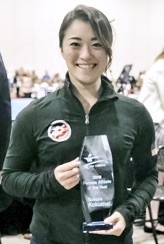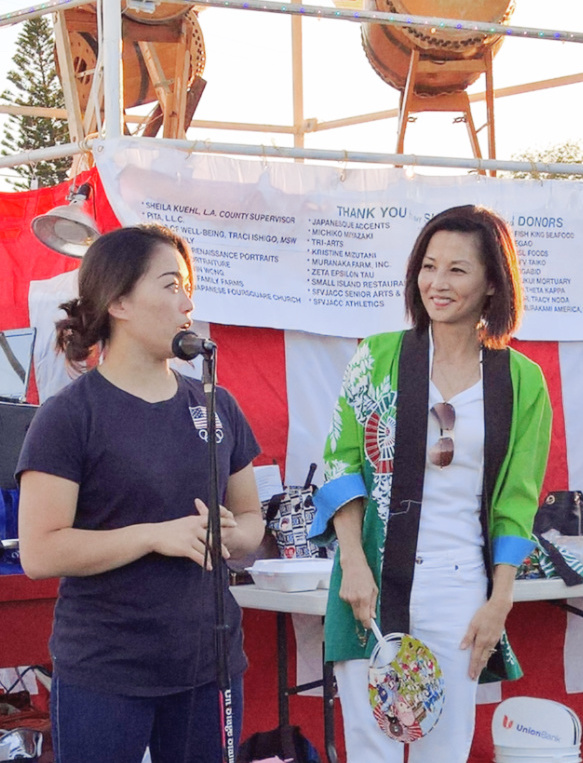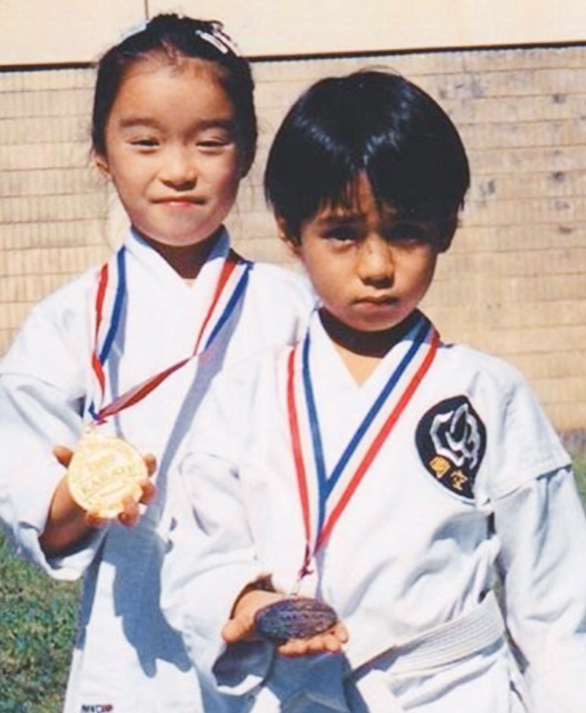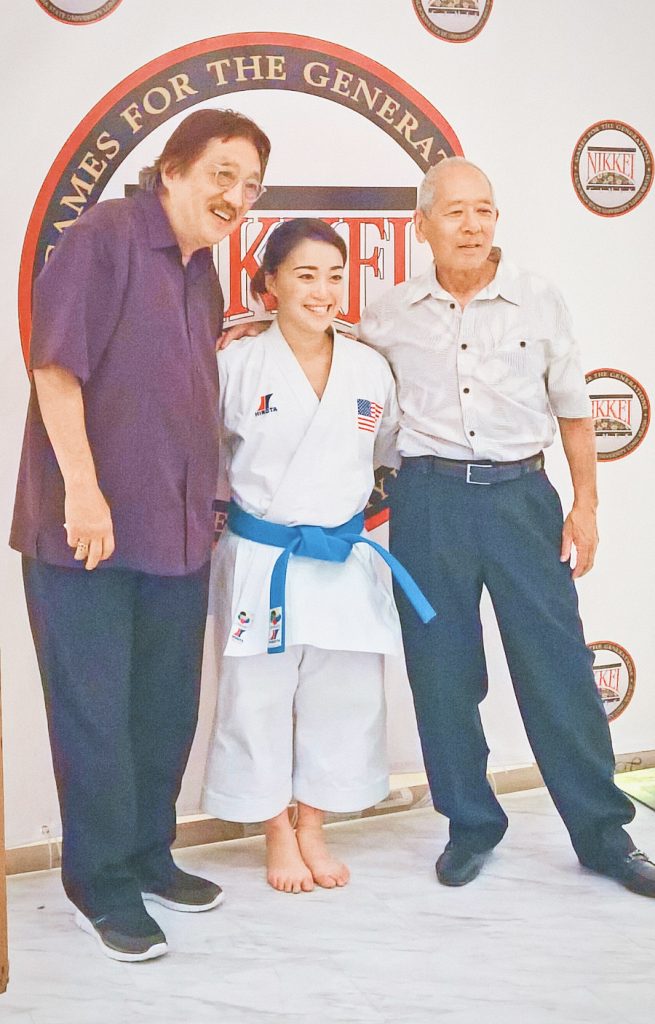Sakura Kokumai displays her prowess as a world-class karate kata competitor. (Photo: Xavier Servolle)
The L.A. County-based karateka presses the pedal to the medal in hopes of competing next summer in Tokyo at the Summer Games.
By P.C. Staff

Sakura Kokumai beams as she display her trophy for being chosen as 2019 Female Athlete of the Year at the USA Karate Nationals. (Photo: Meg Aghamyan)
When she’s not in competition mode, Sakura Kokumai has a pleasant, friendly demeanor, and she looks like she could still be a college student.
But when Kokumai is wearing her karate gi and performing a kata, she becomes focused, fierce and formidable.
Art Ishii concurs. As chairman of the Nisei Week Nikkei Games and a rokudan karateka who is the senior instructor at Matsubayashi Shōrin Ryū of Little Tokyo in Los Angeles, Ishii said, “What stands out with Sakura is her ability to focus on what she’s doing. In discussions with her, I find her to be very disciplined, and she has her goals set. She has the discipline to do what it takes.
“She is totally committed,” Ishii continued. “. . . I’ve seen world-class kata performed in many tournaments, and she clearly is in the top echelon of women’s kata.”
As such, the 26-year-old, Hawaii-born Kokumai also appears to be one of — if not the — United States’ best hope to win a medal in karate, which is making its Olympics debut at next year’s Summer Games in Tokyo.
According to Kokumai, the karate competition will be divided into two categories (subdivided by respective gender): kumite, where two competitors in the same weight class actually throw hands and feet, and kata, where competitors are judged for how well they perform a preset form or series of movements traditionally used to train karateka in the fundamentals and practical applications for a particular hand, foot, elbow or knee strike.
The category in which Kokumai hopes to compete is female individual kata.
If she makes the cut, Kokumai will be just one of 10 women kata competitors from the entire world vying for a medal of gold, silver or bronze. (As the host nation, Japan automatically gets one of the 10 spots per gender.)

Sakura Kokumai, left, addresses the San Fernando Valley Obon in July with actress Tamlyn Tomita. (Photo: Susan Yokoyama)
In the months between now and the beginning of the next Olympics on July 24, 2020, Kokumai will be training and participating in World Karate Federation and USA National Karate-do Federation sanctioned Premier League tournaments and competitions at a rate of about one per month, traveling to spots around the world so that she can qualify.
“We compete, we win rounds and we get the points, which are directly transferred to the world ranking system,” Kokumai told the Pacific Citizen exclusively.
The points she referred to are called “Olympic points,” and competitors need to accrue as many as possible in the run-up to the Games. Even now, Kokumai is currently attending the Pan American Games* in Lima, Peru, which run until Aug. 11.
Kokumai will be a favorite there, having in mid-July been named the 2019 Female Athlete of the Year at the USA Karate Nationals, after her eighth first-place finish in the category “Female Elite Kata.”
For Kokumai, currently ranked No. 1 in the U.S., the training and travel regimen between now and the Olympics will be like a yearlong marathon — and afterward, there is also the Karate World Championships to consider in November 2020, set to take place in Dubai.
With the strong likelihood that Kokumai will earn a spot on the U.S. Olympic team sometime next spring, it will be the culmination of about 20 years of practicing karate, mainly in the style Shitō-ryū, but in years past, she also studied Shotokan, Gojū-ryū and Ryūei-ryū.
Ironically, despite her many accolades, earning a spot on the U.S. Olympic team as a karate kata competitor was never Kokumai’s goal. It only became a consideration for her and other karateka around the world after the International Olympic Committee announced in 2015 that karate — along with baseball/softball, sport climbing, surfing and skateboarding — would become an Olympic sport for the 2020 Games.
It was an unasked-for option in which Kokumai found herself at the right time and place, coupled with having the right skills.
With the Summer Olympics returning to Japan for the first time since 1964, the IOC’s addition of karate was like a gift to Japan, as well as a one-off opportunity for Kokumai, since karate will not be part of the 2024 Summer Olympics.
◊◊◊
When Chieko and Keiji Kokumai originally moved from Okayama Prefecture’s Tamano city years ago to live in the U.S., karate was not high on the to-do list for their future children.

Sakura Kokumai and her brother, Alex Kokumai, when both siblings practice karate. (Photo: Courtesy of Sakura Kokumai)
In fact, the Hawaii-born Sakura Kokumai said that she is the only member of her family — she also has a brother two years younger — to practice the martial art, which can trace its origins to Okinawa Prefecture, Southern China and India.
Her motivation for studying karate, which translates to “empty hand,” has evolved over the years.
Kokumai told the Pacific Citizen: “Everything I learned in karate, I can apply it to life outside of the sport.”
Because of her bicultural and bilingual upbringing, Kokumai attended college in Japan, first at Doshisha University, where she focused on linguistics and education, then to Waseda University for a master’s degree in international studies. She also, however, continued to practice karate along the way.
Also, because of her bicultural background, Kokumai has been asked if she chose to represent the U.S. in karate for the Olympics for opportunistic reasons, in other words because the competition to land a spot on the U.S. team would be easier than if she wanted to compete for Japan.
Having been a member of the USA Karate National Team since 2007, the fourth-degree or yondan karateka scoffs at that characterization.
“Karate was never in the Olympics in the first place. It all just came at the right time. I did karate because I love the sport. I’ve represented the sport since I was 14. I never chose something over something else,” Kokumai told the P.C.
In a variation of how the loyalty of Nisei to the U.S. was questioned during WWII, Kokumai said sometimes she has encountered Japanese people who think the same thing about herself, albeit with a more positive spin.
“It’s always been a topic that the Japanese people tend to bring up,” Kokumai says about the reaction after the IOC announced karate’s inclusion in the Olympics.
“They would say, ‘Oh, Sakura, you were so smart that you decided to represent the U.S.A. for the Olympics so that you can go to the Games,’ or, ‘Why did you choose the U.S. over Japan?’” she said.
“I would get those questions a lot, especially by the Japanese media,” Kokumai continued. “It’s always been hard because, for me, I started karate in Hawaii. I looked up to athletes on the U.S.A. team. There was never a point where it was like, ‘I have to choose.’ Naturally, I’ve represented the U.S. since I was 14. So, those kinds of questions always tend to come up.”
For Kokumai, pursuing the path of karate has been a journey in which the journey itself was its own reward, with the awards and recognition more like an unintended positive outcome.
“It’s not gymnastics, track or swimming where everyone knows the sport and the athletes that are involved in it,” Kokumai said. “But that feeling of all the sacrifice, pain and hard work paying off is an incredible feeling. It makes it all worth it.”

Kokumai, center, at the Nikkei Games banquet with Mike Murase (left) and Sensei Art Ishii. (Photo: Susan Yokoyama)
Ishii noted how that for Kokumai, her commitment to karate is something many people may not realize is a solitary, even lonely pursuit.
“Unlike, say, the U.S. basketball team — they practice together, they train together, they travel together — in this karate world, because she’s a specialist in women’s kata, it’s a lonely world, unlike a volleyball or basketball team. She travels to competitions all over the world by herself,” Ishii said.
“It’s a committed, lonely journey,” he continued. “When you think about it in those terms, it’s even more of a commitment because you’re the one who has to get up, you’re the one who has to say, ‘Oh, I’ve got to train, I’ve got to prepare and then I’ve got to go to Turkey in four days,’ and then come back and train some more.”
Ishii noted that despite her busy schedule and having to prepare for the Pan Am Games, Kokumai committed to appear at the Nikkei Games banquet in Orange County on July 25 to perform karate kata.
Right now, Kokumai’s eyes are on making sure she attends all the necessary tournaments between now and the Olympics, with little thought to what she might do afterward, such as follow in the footsteps of American judoka Ronda Rousey, who parlayed an Olympic bronze medal into an action movie career.
“If the opportunity comes, I would love to give it a shot,” Kokumai laughed. “But people who know my personality know that I’m a very shy person. So me being involved in that is something I’d never expect.
“It’s pretty scary not to have plans after the Olympics,” she continued, “but I obviously will be involved in karate. I won’t retire from that — ever.”
[*Editor’s note: Kokumai won first place in the women’s individual kata category at the 2019 Pan American Games on Aug. 9.]
Kokumai, far right, addresses students at the Matsubayashi Shōrin-Ryū of Little Tokyo dōjō. (Photo: Susan Yokoyama)




